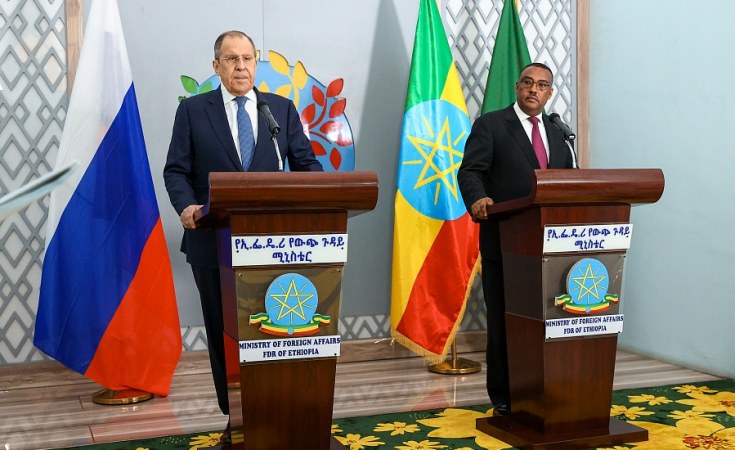Addis Ababa — Ladies and Gentlemen.
I would like to thank our Ethiopian friends for their hospitality and meaningful talks that started with the meeting with President Sahle-Work Zewde and continued with my colleague Demeke Mekonnen.
Our talks were sincere and trust-based as is usual with friends. We have established a regular political dialogue. Demeke Mekonnen visited Russia in June 2021. Now I am in Ethiopia on a reciprocal visit. Ties between our countries have a long-standing record of friendship, mutual empathy, solidarity and joint creativity.
We focused on an analysis of the further development of our cooperation with an emphasis on the trade, economic and investment areas, which are marked by positive dynamics. It is important to support this, and work, in part, on further diversifying the range of commodities in trade and the development of modern logistics and financial chains that can ensure the steady operation of economic operators.
In this context, we discussed promising areas for the future cooperation of our business communities, such as energy engineering, transport infrastructure, telecommunications, information security, agricultural production and mineral extraction. We agreed to work out a thorough agenda in these areas to prepare for the regular meeting of the Russia-Ethiopia Intergovernmental Commission on Economic, Scientific and Technical Cooperation and Trade scheduled for this October in Addis Ababa.
We have developed a positive tradition of military-technical cooperation (MTC). We reaffirmed our willingness to implement new plans in this area, including working with of our Ethiopian friends to ensure their defensive capability.
We intend to continue developing our humanitarian and cultural contacts and cooperation in education. Russia will continue helping Ethiopia educate skilled professionals in diverse areas.
We will continue to upgrade our cooperation in healthcare. Our hospital operates in Ethiopia via the Russian Red Cross. We discussed ways of making its work more effective. In addition, we reviewed ways to convert a joint Russian-Ethiopian epidemiological expedition into a permanent centre.
Our partners updated us on domestic political developments in Ethiopia. We confirmed our strong support for the government’s efforts to stabilise the situation and launch an inclusive national dialogue to resolve the key items on the national agenda.
Our positions on key regional and international issues have traditionally been identical or close because they rely on Russia and Ethiopia’s firm commitments to international law, primarily, the principles of the UN Charter, especially including respect for the sovereign equality of states. We see that the attempts by the United States and its allies to impose their views and development models on other nations and to promote their geopolitical zero-sum games run counter to these principles.
We informed our Ethiopian friends about the recent developments in the special military operation in Ukraine. Ethiopia holds a well-balanced, responsible position on this issue in the UN and other associations.
The talks in Addis Ababa and our previous contacts with the African countries we visited prior to Ethiopia show that our African colleagues understand perfectly well the root causes of what is happening. They see the attempts by the collective West to cling to the evaporating future of the so-called unipolar world and impede the objective historical process of the creation of a fair, democratic order.
The striving of the African nations to decide their own destinies and find ways of settling persisting conflicts are part of the formation of this multipolar, democratic world order. Russia will support the aspirations of its African friends. We believe all countries, including UN Security Council members, must respect Africa’s right to find African solutions to African problems. We will support the international community in its bid to promote these efforts by including African initiatives in UN resolutions and facilitating the buildup of their peacemaking potential.
We intend to conduct intensive and thorough work on all of these issues, including the search for new and modern ways of developing and ensuring security in trade and economic ties, and cooperation in international affairs, to guarantee a meaningful agenda at the second Russia-Africa summit scheduled for 2023.
At the conclusion of our talks, I invited my colleague Demeke Mekonnen, Foreign Minister of the Federal Democratic Republic of Ethiopia, to visit the Russian Federation at his convenience.


